Taxation Law: Case Analysis of Harding vs Commissioner of Taxation
VerifiedAdded on 2023/01/19
|8
|2453
|56
Report
AI Summary
This report provides a comprehensive analysis of the Harding vs Commissioner of Taxation case, focusing on Australian tax law, particularly the determination of tax residency and the concept of a permanent place of abode. The case involves an Australian expat living and working in Bahrain, and the central issue is whether his overseas accommodation qualifies as a permanent place of abode, thus affecting his tax residency status. The report examines the arguments presented by both the taxpayer and the Australian Taxation Office (ATO), as well as the rulings of the Federal Court and the Full Federal Court. It delves into the implications of tax laws for individuals living overseas, including the application of double tax treaties and the criteria used by the ATO to determine tax residency. The report also discusses the factors considered by courts and boards of review when assessing permanent abode, such as the length and intention of stay, and the establishment of a home outside Australia. Ultimately, the report highlights the significance of the Harding case in clarifying the interpretation of 'permanent place of abode' and its impact on Australian expatriates' tax obligations, emphasizing that a permanent place of abode does not necessarily require continuous residence in one location but rather identification with a specific country.
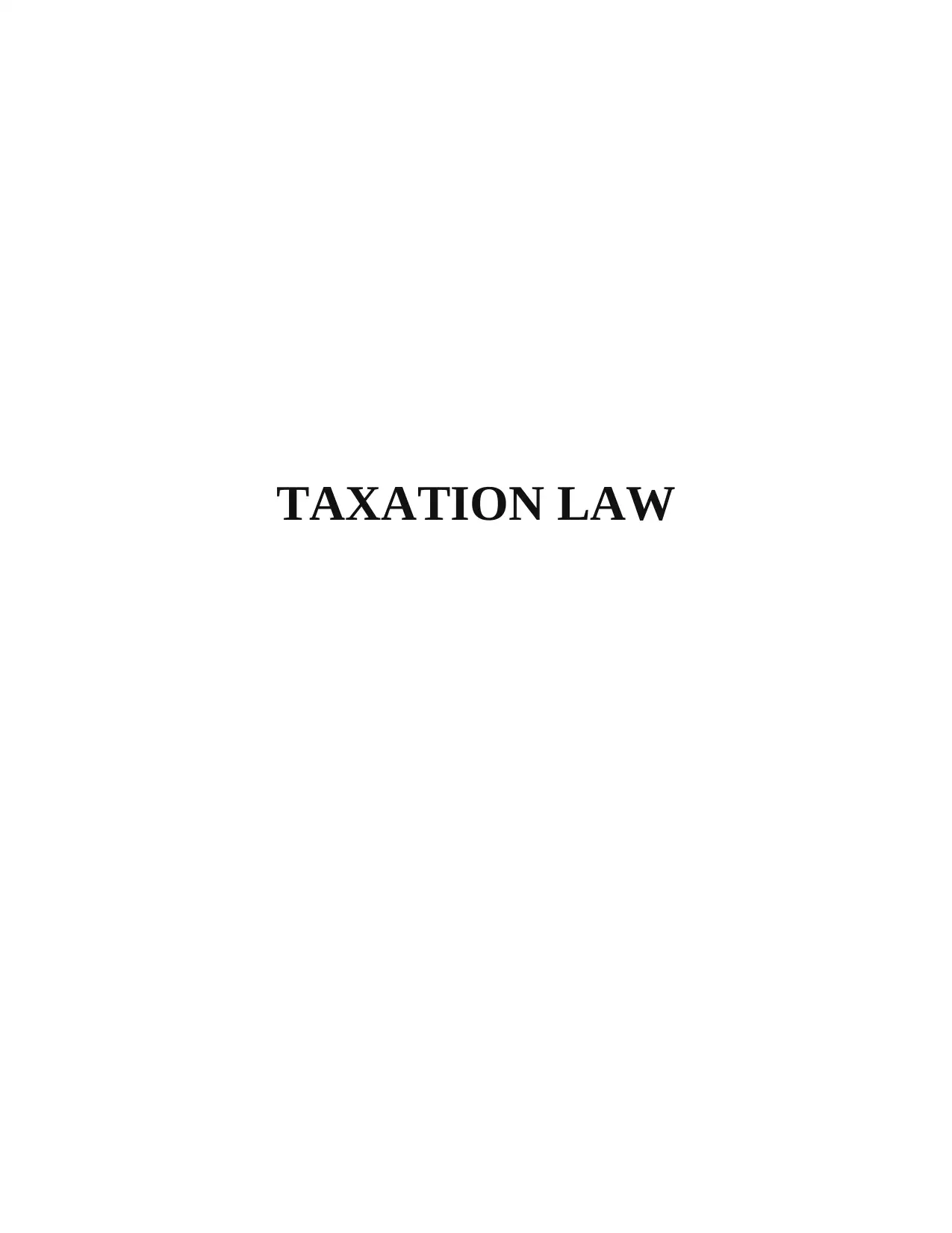
TAXATION LAW
Paraphrase This Document
Need a fresh take? Get an instant paraphrase of this document with our AI Paraphraser

TABLE OF CONTENTS
Harding vs Commissioner of Taxation............................................................................................1
REFERENCES................................................................................................................................6
Harding vs Commissioner of Taxation............................................................................................1
REFERENCES................................................................................................................................6
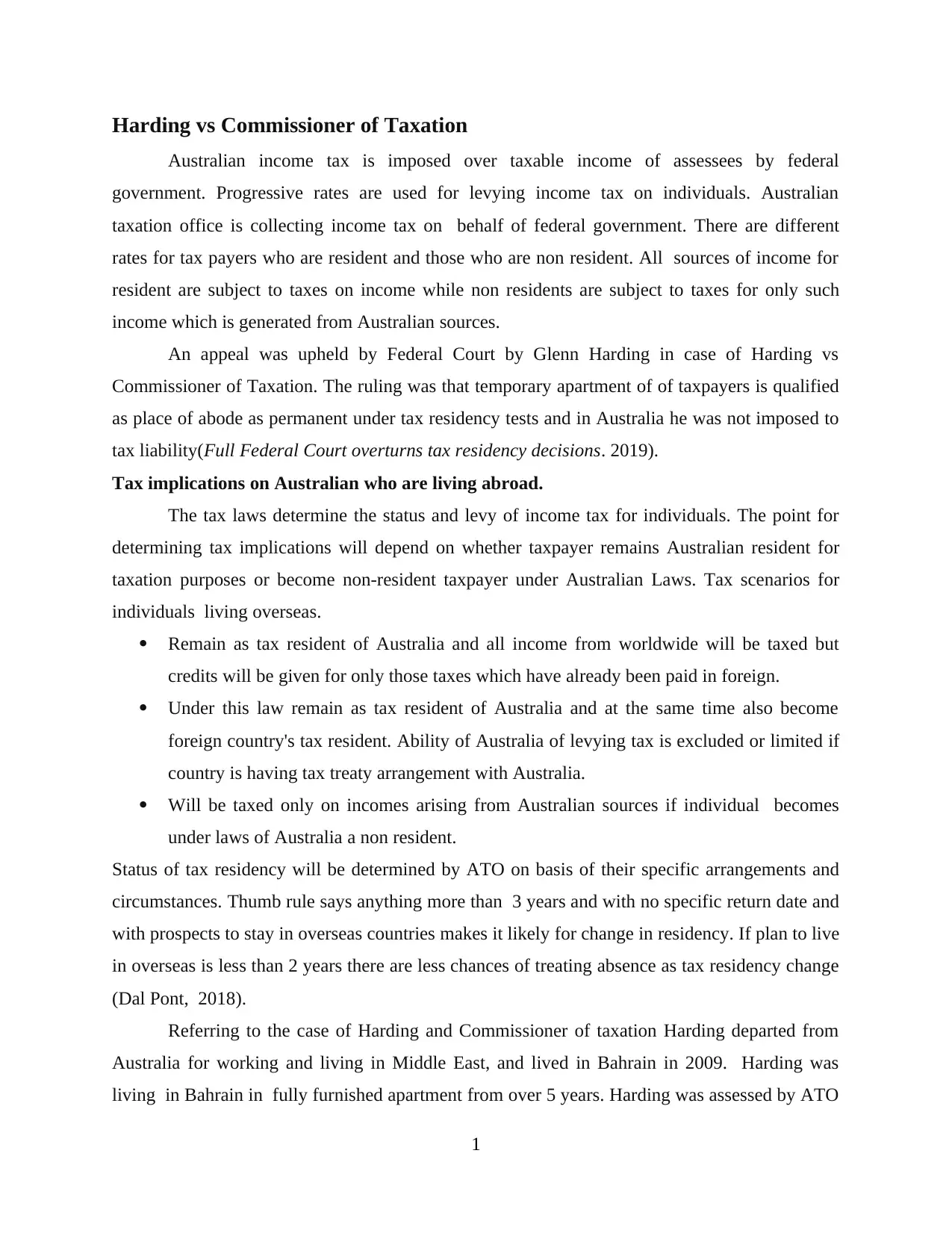
Harding vs Commissioner of Taxation
Australian income tax is imposed over taxable income of assessees by federal
government. Progressive rates are used for levying income tax on individuals. Australian
taxation office is collecting income tax on behalf of federal government. There are different
rates for tax payers who are resident and those who are non resident. All sources of income for
resident are subject to taxes on income while non residents are subject to taxes for only such
income which is generated from Australian sources.
An appeal was upheld by Federal Court by Glenn Harding in case of Harding vs
Commissioner of Taxation. The ruling was that temporary apartment of of taxpayers is qualified
as place of abode as permanent under tax residency tests and in Australia he was not imposed to
tax liability(Full Federal Court overturns tax residency decisions. 2019).
Tax implications on Australian who are living abroad.
The tax laws determine the status and levy of income tax for individuals. The point for
determining tax implications will depend on whether taxpayer remains Australian resident for
taxation purposes or become non-resident taxpayer under Australian Laws. Tax scenarios for
individuals living overseas.
Remain as tax resident of Australia and all income from worldwide will be taxed but
credits will be given for only those taxes which have already been paid in foreign.
Under this law remain as tax resident of Australia and at the same time also become
foreign country's tax resident. Ability of Australia of levying tax is excluded or limited if
country is having tax treaty arrangement with Australia.
Will be taxed only on incomes arising from Australian sources if individual becomes
under laws of Australia a non resident.
Status of tax residency will be determined by ATO on basis of their specific arrangements and
circumstances. Thumb rule says anything more than 3 years and with no specific return date and
with prospects to stay in overseas countries makes it likely for change in residency. If plan to live
in overseas is less than 2 years there are less chances of treating absence as tax residency change
(Dal Pont, 2018).
Referring to the case of Harding and Commissioner of taxation Harding departed from
Australia for working and living in Middle East, and lived in Bahrain in 2009. Harding was
living in Bahrain in fully furnished apartment from over 5 years. Harding was assessed by ATO
1
Australian income tax is imposed over taxable income of assessees by federal
government. Progressive rates are used for levying income tax on individuals. Australian
taxation office is collecting income tax on behalf of federal government. There are different
rates for tax payers who are resident and those who are non resident. All sources of income for
resident are subject to taxes on income while non residents are subject to taxes for only such
income which is generated from Australian sources.
An appeal was upheld by Federal Court by Glenn Harding in case of Harding vs
Commissioner of Taxation. The ruling was that temporary apartment of of taxpayers is qualified
as place of abode as permanent under tax residency tests and in Australia he was not imposed to
tax liability(Full Federal Court overturns tax residency decisions. 2019).
Tax implications on Australian who are living abroad.
The tax laws determine the status and levy of income tax for individuals. The point for
determining tax implications will depend on whether taxpayer remains Australian resident for
taxation purposes or become non-resident taxpayer under Australian Laws. Tax scenarios for
individuals living overseas.
Remain as tax resident of Australia and all income from worldwide will be taxed but
credits will be given for only those taxes which have already been paid in foreign.
Under this law remain as tax resident of Australia and at the same time also become
foreign country's tax resident. Ability of Australia of levying tax is excluded or limited if
country is having tax treaty arrangement with Australia.
Will be taxed only on incomes arising from Australian sources if individual becomes
under laws of Australia a non resident.
Status of tax residency will be determined by ATO on basis of their specific arrangements and
circumstances. Thumb rule says anything more than 3 years and with no specific return date and
with prospects to stay in overseas countries makes it likely for change in residency. If plan to live
in overseas is less than 2 years there are less chances of treating absence as tax residency change
(Dal Pont, 2018).
Referring to the case of Harding and Commissioner of taxation Harding departed from
Australia for working and living in Middle East, and lived in Bahrain in 2009. Harding was
living in Bahrain in fully furnished apartment from over 5 years. Harding was assessed by ATO
1
⊘ This is a preview!⊘
Do you want full access?
Subscribe today to unlock all pages.

Trusted by 1+ million students worldwide
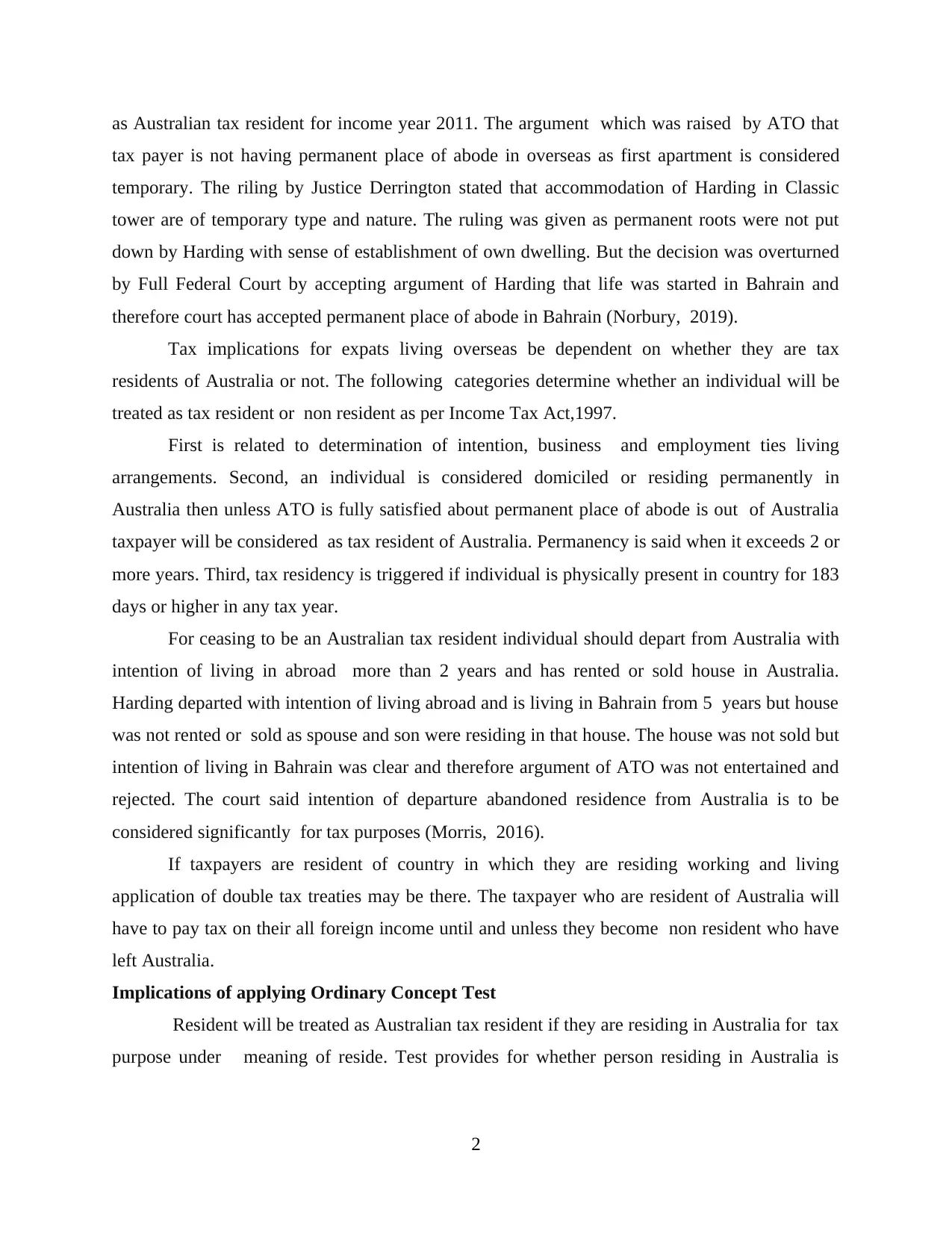
as Australian tax resident for income year 2011. The argument which was raised by ATO that
tax payer is not having permanent place of abode in overseas as first apartment is considered
temporary. The riling by Justice Derrington stated that accommodation of Harding in Classic
tower are of temporary type and nature. The ruling was given as permanent roots were not put
down by Harding with sense of establishment of own dwelling. But the decision was overturned
by Full Federal Court by accepting argument of Harding that life was started in Bahrain and
therefore court has accepted permanent place of abode in Bahrain (Norbury, 2019).
Tax implications for expats living overseas be dependent on whether they are tax
residents of Australia or not. The following categories determine whether an individual will be
treated as tax resident or non resident as per Income Tax Act,1997.
First is related to determination of intention, business and employment ties living
arrangements. Second, an individual is considered domiciled or residing permanently in
Australia then unless ATO is fully satisfied about permanent place of abode is out of Australia
taxpayer will be considered as tax resident of Australia. Permanency is said when it exceeds 2 or
more years. Third, tax residency is triggered if individual is physically present in country for 183
days or higher in any tax year.
For ceasing to be an Australian tax resident individual should depart from Australia with
intention of living in abroad more than 2 years and has rented or sold house in Australia.
Harding departed with intention of living abroad and is living in Bahrain from 5 years but house
was not rented or sold as spouse and son were residing in that house. The house was not sold but
intention of living in Bahrain was clear and therefore argument of ATO was not entertained and
rejected. The court said intention of departure abandoned residence from Australia is to be
considered significantly for tax purposes (Morris, 2016).
If taxpayers are resident of country in which they are residing working and living
application of double tax treaties may be there. The taxpayer who are resident of Australia will
have to pay tax on their all foreign income until and unless they become non resident who have
left Australia.
Implications of applying Ordinary Concept Test
Resident will be treated as Australian tax resident if they are residing in Australia for tax
purpose under meaning of reside. Test provides for whether person residing in Australia is
2
tax payer is not having permanent place of abode in overseas as first apartment is considered
temporary. The riling by Justice Derrington stated that accommodation of Harding in Classic
tower are of temporary type and nature. The ruling was given as permanent roots were not put
down by Harding with sense of establishment of own dwelling. But the decision was overturned
by Full Federal Court by accepting argument of Harding that life was started in Bahrain and
therefore court has accepted permanent place of abode in Bahrain (Norbury, 2019).
Tax implications for expats living overseas be dependent on whether they are tax
residents of Australia or not. The following categories determine whether an individual will be
treated as tax resident or non resident as per Income Tax Act,1997.
First is related to determination of intention, business and employment ties living
arrangements. Second, an individual is considered domiciled or residing permanently in
Australia then unless ATO is fully satisfied about permanent place of abode is out of Australia
taxpayer will be considered as tax resident of Australia. Permanency is said when it exceeds 2 or
more years. Third, tax residency is triggered if individual is physically present in country for 183
days or higher in any tax year.
For ceasing to be an Australian tax resident individual should depart from Australia with
intention of living in abroad more than 2 years and has rented or sold house in Australia.
Harding departed with intention of living abroad and is living in Bahrain from 5 years but house
was not rented or sold as spouse and son were residing in that house. The house was not sold but
intention of living in Bahrain was clear and therefore argument of ATO was not entertained and
rejected. The court said intention of departure abandoned residence from Australia is to be
considered significantly for tax purposes (Morris, 2016).
If taxpayers are resident of country in which they are residing working and living
application of double tax treaties may be there. The taxpayer who are resident of Australia will
have to pay tax on their all foreign income until and unless they become non resident who have
left Australia.
Implications of applying Ordinary Concept Test
Resident will be treated as Australian tax resident if they are residing in Australia for tax
purpose under meaning of reside. Test provides for whether person residing in Australia is
2
Paraphrase This Document
Need a fresh take? Get an instant paraphrase of this document with our AI Paraphraser
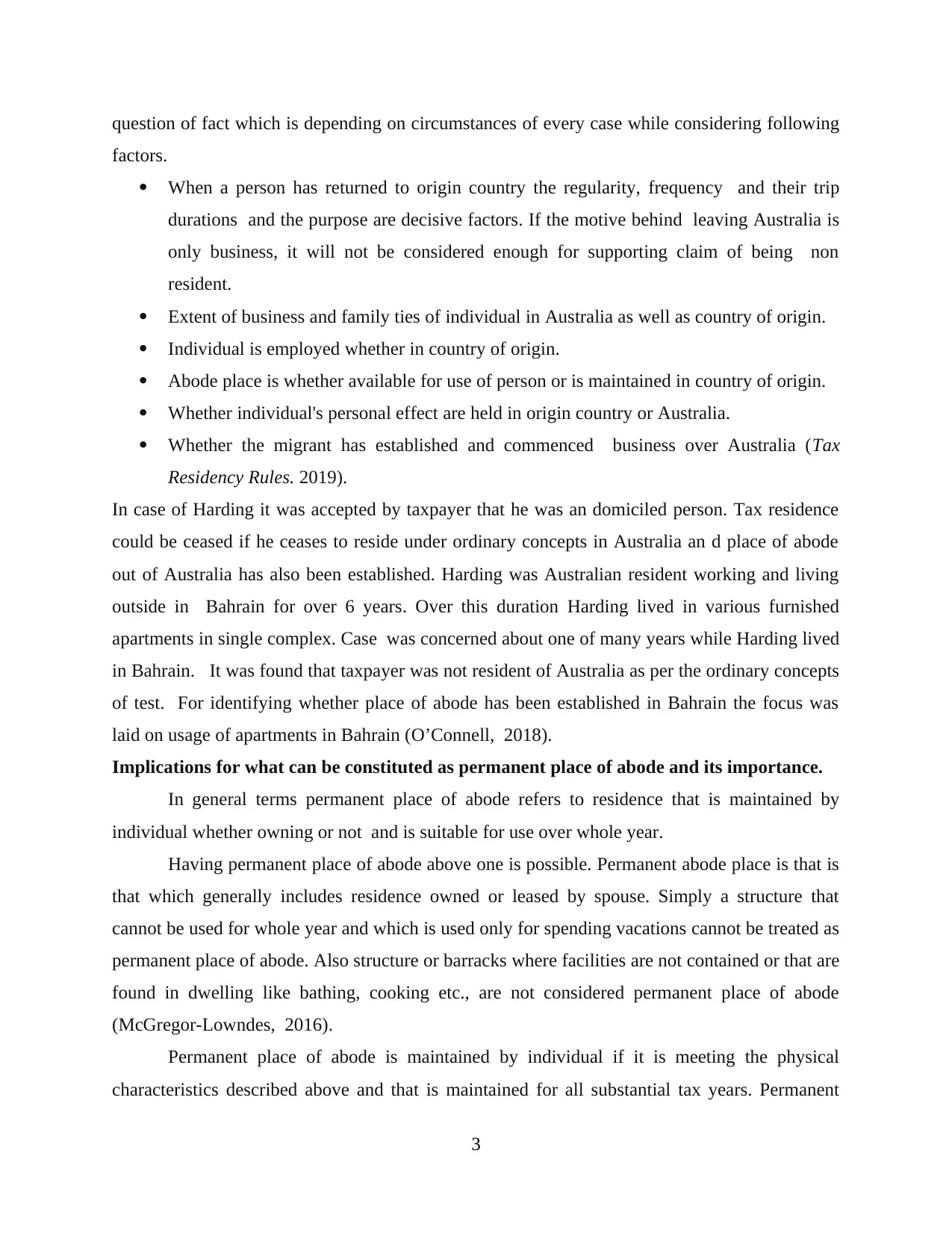
question of fact which is depending on circumstances of every case while considering following
factors.
When a person has returned to origin country the regularity, frequency and their trip
durations and the purpose are decisive factors. If the motive behind leaving Australia is
only business, it will not be considered enough for supporting claim of being non
resident.
Extent of business and family ties of individual in Australia as well as country of origin.
Individual is employed whether in country of origin.
Abode place is whether available for use of person or is maintained in country of origin.
Whether individual's personal effect are held in origin country or Australia.
Whether the migrant has established and commenced business over Australia (Tax
Residency Rules. 2019).
In case of Harding it was accepted by taxpayer that he was an domiciled person. Tax residence
could be ceased if he ceases to reside under ordinary concepts in Australia an d place of abode
out of Australia has also been established. Harding was Australian resident working and living
outside in Bahrain for over 6 years. Over this duration Harding lived in various furnished
apartments in single complex. Case was concerned about one of many years while Harding lived
in Bahrain. It was found that taxpayer was not resident of Australia as per the ordinary concepts
of test. For identifying whether place of abode has been established in Bahrain the focus was
laid on usage of apartments in Bahrain (O’Connell, 2018).
Implications for what can be constituted as permanent place of abode and its importance.
In general terms permanent place of abode refers to residence that is maintained by
individual whether owning or not and is suitable for use over whole year.
Having permanent place of abode above one is possible. Permanent abode place is that is
that which generally includes residence owned or leased by spouse. Simply a structure that
cannot be used for whole year and which is used only for spending vacations cannot be treated as
permanent place of abode. Also structure or barracks where facilities are not contained or that are
found in dwelling like bathing, cooking etc., are not considered permanent place of abode
(McGregor-Lowndes, 2016).
Permanent place of abode is maintained by individual if it is meeting the physical
characteristics described above and that is maintained for all substantial tax years. Permanent
3
factors.
When a person has returned to origin country the regularity, frequency and their trip
durations and the purpose are decisive factors. If the motive behind leaving Australia is
only business, it will not be considered enough for supporting claim of being non
resident.
Extent of business and family ties of individual in Australia as well as country of origin.
Individual is employed whether in country of origin.
Abode place is whether available for use of person or is maintained in country of origin.
Whether individual's personal effect are held in origin country or Australia.
Whether the migrant has established and commenced business over Australia (Tax
Residency Rules. 2019).
In case of Harding it was accepted by taxpayer that he was an domiciled person. Tax residence
could be ceased if he ceases to reside under ordinary concepts in Australia an d place of abode
out of Australia has also been established. Harding was Australian resident working and living
outside in Bahrain for over 6 years. Over this duration Harding lived in various furnished
apartments in single complex. Case was concerned about one of many years while Harding lived
in Bahrain. It was found that taxpayer was not resident of Australia as per the ordinary concepts
of test. For identifying whether place of abode has been established in Bahrain the focus was
laid on usage of apartments in Bahrain (O’Connell, 2018).
Implications for what can be constituted as permanent place of abode and its importance.
In general terms permanent place of abode refers to residence that is maintained by
individual whether owning or not and is suitable for use over whole year.
Having permanent place of abode above one is possible. Permanent abode place is that is
that which generally includes residence owned or leased by spouse. Simply a structure that
cannot be used for whole year and which is used only for spending vacations cannot be treated as
permanent place of abode. Also structure or barracks where facilities are not contained or that are
found in dwelling like bathing, cooking etc., are not considered permanent place of abode
(McGregor-Lowndes, 2016).
Permanent place of abode is maintained by individual if it is meeting the physical
characteristics described above and that is maintained for all substantial tax years. Permanent
3
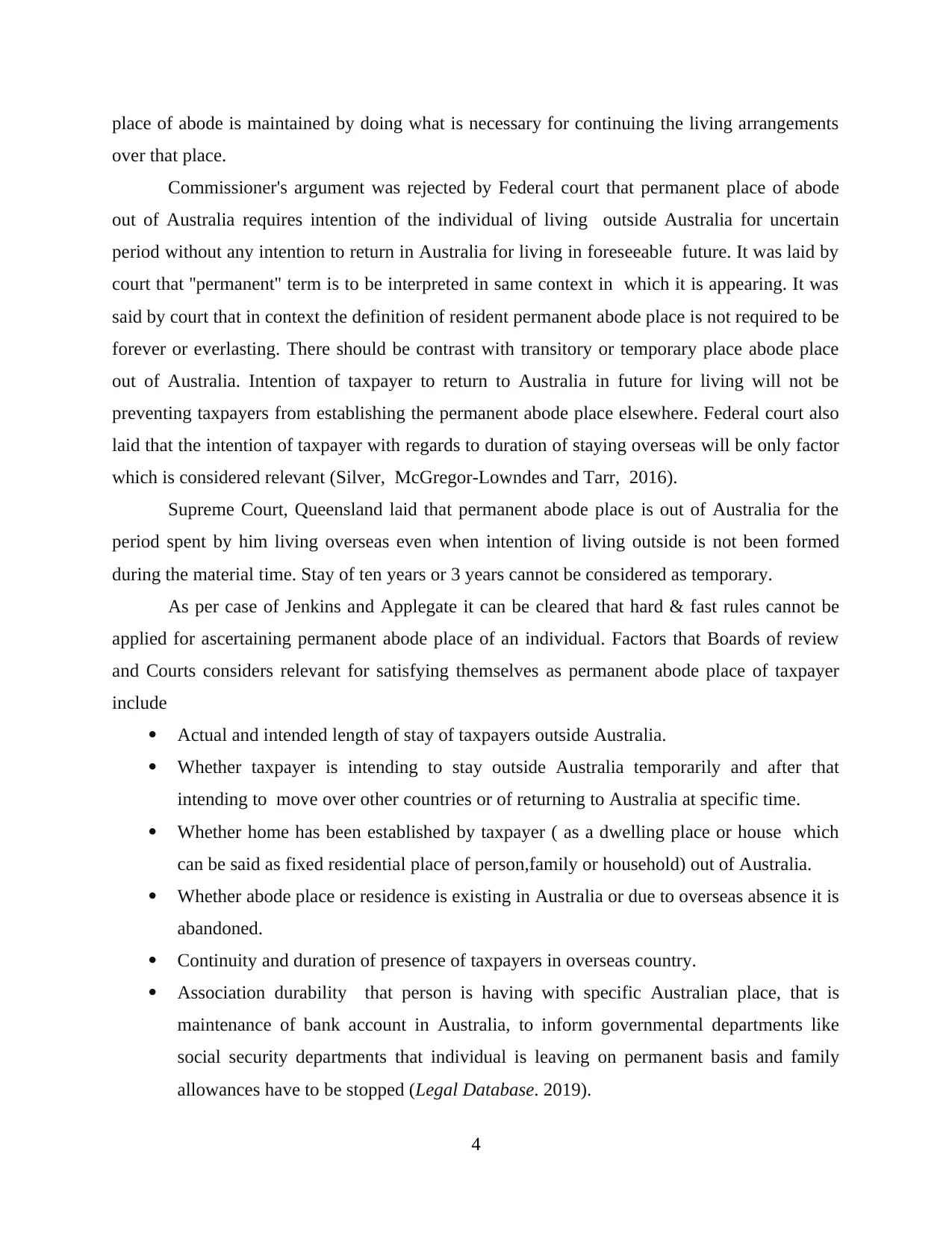
place of abode is maintained by doing what is necessary for continuing the living arrangements
over that place.
Commissioner's argument was rejected by Federal court that permanent place of abode
out of Australia requires intention of the individual of living outside Australia for uncertain
period without any intention to return in Australia for living in foreseeable future. It was laid by
court that ''permanent'' term is to be interpreted in same context in which it is appearing. It was
said by court that in context the definition of resident permanent abode place is not required to be
forever or everlasting. There should be contrast with transitory or temporary place abode place
out of Australia. Intention of taxpayer to return to Australia in future for living will not be
preventing taxpayers from establishing the permanent abode place elsewhere. Federal court also
laid that the intention of taxpayer with regards to duration of staying overseas will be only factor
which is considered relevant (Silver, McGregor-Lowndes and Tarr, 2016).
Supreme Court, Queensland laid that permanent abode place is out of Australia for the
period spent by him living overseas even when intention of living outside is not been formed
during the material time. Stay of ten years or 3 years cannot be considered as temporary.
As per case of Jenkins and Applegate it can be cleared that hard & fast rules cannot be
applied for ascertaining permanent abode place of an individual. Factors that Boards of review
and Courts considers relevant for satisfying themselves as permanent abode place of taxpayer
include
Actual and intended length of stay of taxpayers outside Australia.
Whether taxpayer is intending to stay outside Australia temporarily and after that
intending to move over other countries or of returning to Australia at specific time.
Whether home has been established by taxpayer ( as a dwelling place or house which
can be said as fixed residential place of person,family or household) out of Australia.
Whether abode place or residence is existing in Australia or due to overseas absence it is
abandoned.
Continuity and duration of presence of taxpayers in overseas country.
Association durability that person is having with specific Australian place, that is
maintenance of bank account in Australia, to inform governmental departments like
social security departments that individual is leaving on permanent basis and family
allowances have to be stopped (Legal Database. 2019).
4
over that place.
Commissioner's argument was rejected by Federal court that permanent place of abode
out of Australia requires intention of the individual of living outside Australia for uncertain
period without any intention to return in Australia for living in foreseeable future. It was laid by
court that ''permanent'' term is to be interpreted in same context in which it is appearing. It was
said by court that in context the definition of resident permanent abode place is not required to be
forever or everlasting. There should be contrast with transitory or temporary place abode place
out of Australia. Intention of taxpayer to return to Australia in future for living will not be
preventing taxpayers from establishing the permanent abode place elsewhere. Federal court also
laid that the intention of taxpayer with regards to duration of staying overseas will be only factor
which is considered relevant (Silver, McGregor-Lowndes and Tarr, 2016).
Supreme Court, Queensland laid that permanent abode place is out of Australia for the
period spent by him living overseas even when intention of living outside is not been formed
during the material time. Stay of ten years or 3 years cannot be considered as temporary.
As per case of Jenkins and Applegate it can be cleared that hard & fast rules cannot be
applied for ascertaining permanent abode place of an individual. Factors that Boards of review
and Courts considers relevant for satisfying themselves as permanent abode place of taxpayer
include
Actual and intended length of stay of taxpayers outside Australia.
Whether taxpayer is intending to stay outside Australia temporarily and after that
intending to move over other countries or of returning to Australia at specific time.
Whether home has been established by taxpayer ( as a dwelling place or house which
can be said as fixed residential place of person,family or household) out of Australia.
Whether abode place or residence is existing in Australia or due to overseas absence it is
abandoned.
Continuity and duration of presence of taxpayers in overseas country.
Association durability that person is having with specific Australian place, that is
maintenance of bank account in Australia, to inform governmental departments like
social security departments that individual is leaving on permanent basis and family
allowances have to be stopped (Legal Database. 2019).
4
⊘ This is a preview!⊘
Do you want full access?
Subscribe today to unlock all pages.

Trusted by 1+ million students worldwide
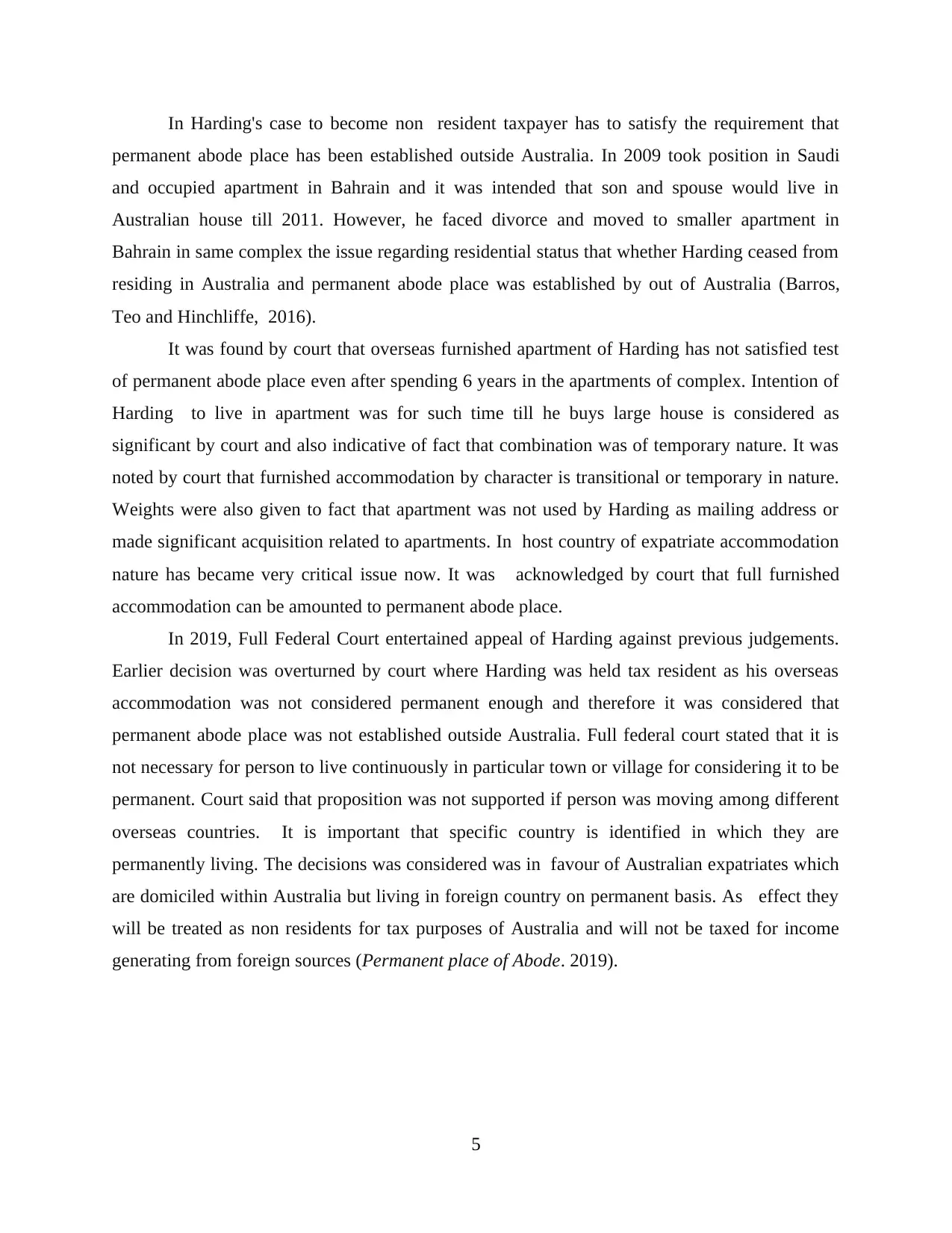
In Harding's case to become non resident taxpayer has to satisfy the requirement that
permanent abode place has been established outside Australia. In 2009 took position in Saudi
and occupied apartment in Bahrain and it was intended that son and spouse would live in
Australian house till 2011. However, he faced divorce and moved to smaller apartment in
Bahrain in same complex the issue regarding residential status that whether Harding ceased from
residing in Australia and permanent abode place was established by out of Australia (Barros,
Teo and Hinchliffe, 2016).
It was found by court that overseas furnished apartment of Harding has not satisfied test
of permanent abode place even after spending 6 years in the apartments of complex. Intention of
Harding to live in apartment was for such time till he buys large house is considered as
significant by court and also indicative of fact that combination was of temporary nature. It was
noted by court that furnished accommodation by character is transitional or temporary in nature.
Weights were also given to fact that apartment was not used by Harding as mailing address or
made significant acquisition related to apartments. In host country of expatriate accommodation
nature has became very critical issue now. It was acknowledged by court that full furnished
accommodation can be amounted to permanent abode place.
In 2019, Full Federal Court entertained appeal of Harding against previous judgements.
Earlier decision was overturned by court where Harding was held tax resident as his overseas
accommodation was not considered permanent enough and therefore it was considered that
permanent abode place was not established outside Australia. Full federal court stated that it is
not necessary for person to live continuously in particular town or village for considering it to be
permanent. Court said that proposition was not supported if person was moving among different
overseas countries. It is important that specific country is identified in which they are
permanently living. The decisions was considered was in favour of Australian expatriates which
are domiciled within Australia but living in foreign country on permanent basis. As effect they
will be treated as non residents for tax purposes of Australia and will not be taxed for income
generating from foreign sources (Permanent place of Abode. 2019).
5
permanent abode place has been established outside Australia. In 2009 took position in Saudi
and occupied apartment in Bahrain and it was intended that son and spouse would live in
Australian house till 2011. However, he faced divorce and moved to smaller apartment in
Bahrain in same complex the issue regarding residential status that whether Harding ceased from
residing in Australia and permanent abode place was established by out of Australia (Barros,
Teo and Hinchliffe, 2016).
It was found by court that overseas furnished apartment of Harding has not satisfied test
of permanent abode place even after spending 6 years in the apartments of complex. Intention of
Harding to live in apartment was for such time till he buys large house is considered as
significant by court and also indicative of fact that combination was of temporary nature. It was
noted by court that furnished accommodation by character is transitional or temporary in nature.
Weights were also given to fact that apartment was not used by Harding as mailing address or
made significant acquisition related to apartments. In host country of expatriate accommodation
nature has became very critical issue now. It was acknowledged by court that full furnished
accommodation can be amounted to permanent abode place.
In 2019, Full Federal Court entertained appeal of Harding against previous judgements.
Earlier decision was overturned by court where Harding was held tax resident as his overseas
accommodation was not considered permanent enough and therefore it was considered that
permanent abode place was not established outside Australia. Full federal court stated that it is
not necessary for person to live continuously in particular town or village for considering it to be
permanent. Court said that proposition was not supported if person was moving among different
overseas countries. It is important that specific country is identified in which they are
permanently living. The decisions was considered was in favour of Australian expatriates which
are domiciled within Australia but living in foreign country on permanent basis. As effect they
will be treated as non residents for tax purposes of Australia and will not be taxed for income
generating from foreign sources (Permanent place of Abode. 2019).
5
Paraphrase This Document
Need a fresh take? Get an instant paraphrase of this document with our AI Paraphraser
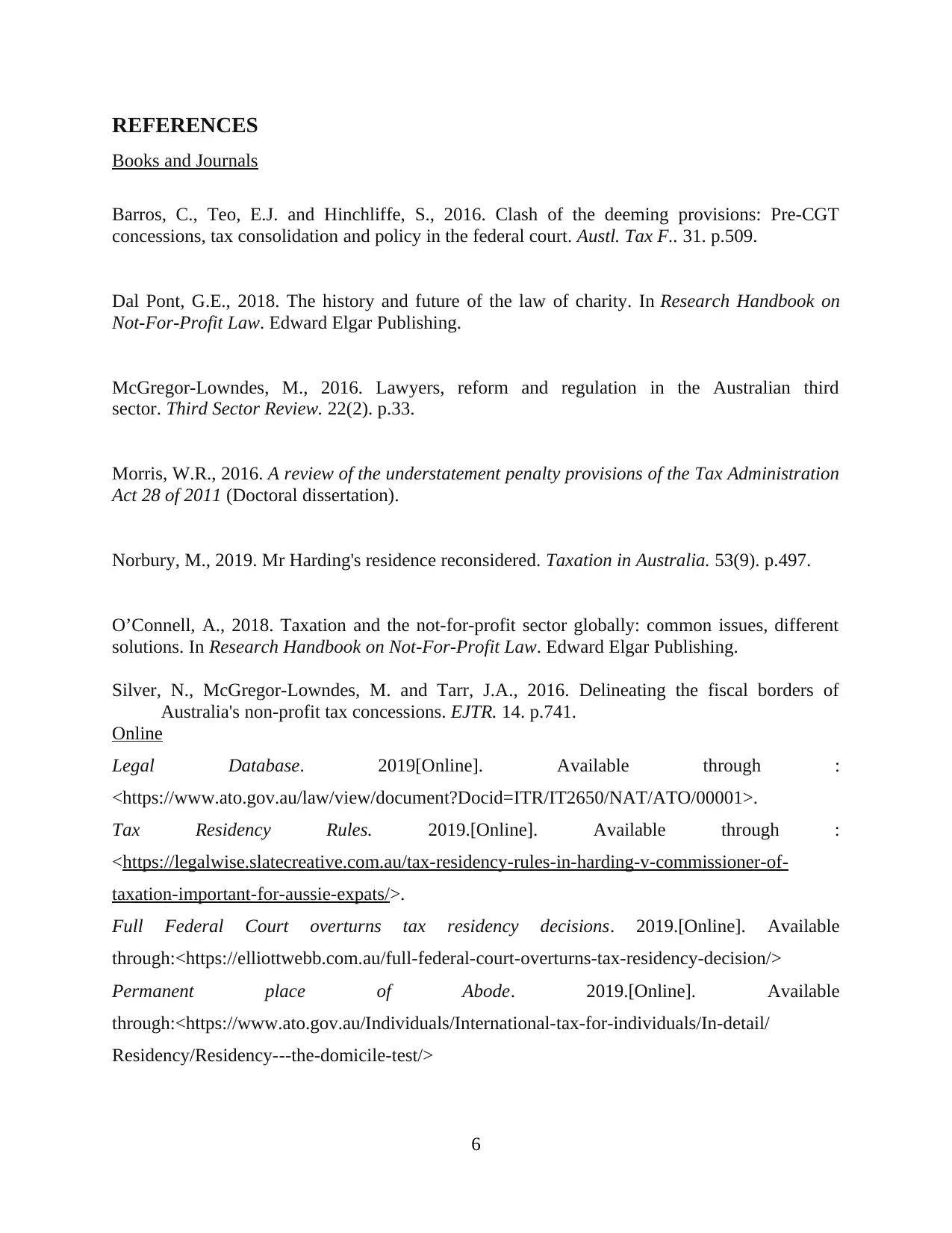
REFERENCES
Books and Journals
Barros, C., Teo, E.J. and Hinchliffe, S., 2016. Clash of the deeming provisions: Pre-CGT
concessions, tax consolidation and policy in the federal court. Austl. Tax F.. 31. p.509.
Dal Pont, G.E., 2018. The history and future of the law of charity. In Research Handbook on
Not-For-Profit Law. Edward Elgar Publishing.
McGregor-Lowndes, M., 2016. Lawyers, reform and regulation in the Australian third
sector. Third Sector Review. 22(2). p.33.
Morris, W.R., 2016. A review of the understatement penalty provisions of the Tax Administration
Act 28 of 2011 (Doctoral dissertation).
Norbury, M., 2019. Mr Harding's residence reconsidered. Taxation in Australia. 53(9). p.497.
O’Connell, A., 2018. Taxation and the not-for-profit sector globally: common issues, different
solutions. In Research Handbook on Not-For-Profit Law. Edward Elgar Publishing.
Silver, N., McGregor-Lowndes, M. and Tarr, J.A., 2016. Delineating the fiscal borders of
Australia's non-profit tax concessions. EJTR. 14. p.741.
Online
Legal Database. 2019[Online]. Available through :
<https://www.ato.gov.au/law/view/document?Docid=ITR/IT2650/NAT/ATO/00001>.
Tax Residency Rules. 2019.[Online]. Available through :
<https://legalwise.slatecreative.com.au/tax-residency-rules-in-harding-v-commissioner-of-
taxation-important-for-aussie-expats/>.
Full Federal Court overturns tax residency decisions. 2019.[Online]. Available
through:<https://elliottwebb.com.au/full-federal-court-overturns-tax-residency-decision/>
Permanent place of Abode. 2019.[Online]. Available
through:<https://www.ato.gov.au/Individuals/International-tax-for-individuals/In-detail/
Residency/Residency---the-domicile-test/>
6
Books and Journals
Barros, C., Teo, E.J. and Hinchliffe, S., 2016. Clash of the deeming provisions: Pre-CGT
concessions, tax consolidation and policy in the federal court. Austl. Tax F.. 31. p.509.
Dal Pont, G.E., 2018. The history and future of the law of charity. In Research Handbook on
Not-For-Profit Law. Edward Elgar Publishing.
McGregor-Lowndes, M., 2016. Lawyers, reform and regulation in the Australian third
sector. Third Sector Review. 22(2). p.33.
Morris, W.R., 2016. A review of the understatement penalty provisions of the Tax Administration
Act 28 of 2011 (Doctoral dissertation).
Norbury, M., 2019. Mr Harding's residence reconsidered. Taxation in Australia. 53(9). p.497.
O’Connell, A., 2018. Taxation and the not-for-profit sector globally: common issues, different
solutions. In Research Handbook on Not-For-Profit Law. Edward Elgar Publishing.
Silver, N., McGregor-Lowndes, M. and Tarr, J.A., 2016. Delineating the fiscal borders of
Australia's non-profit tax concessions. EJTR. 14. p.741.
Online
Legal Database. 2019[Online]. Available through :
<https://www.ato.gov.au/law/view/document?Docid=ITR/IT2650/NAT/ATO/00001>.
Tax Residency Rules. 2019.[Online]. Available through :
<https://legalwise.slatecreative.com.au/tax-residency-rules-in-harding-v-commissioner-of-
taxation-important-for-aussie-expats/>.
Full Federal Court overturns tax residency decisions. 2019.[Online]. Available
through:<https://elliottwebb.com.au/full-federal-court-overturns-tax-residency-decision/>
Permanent place of Abode. 2019.[Online]. Available
through:<https://www.ato.gov.au/Individuals/International-tax-for-individuals/In-detail/
Residency/Residency---the-domicile-test/>
6
1 out of 8
Related Documents
Your All-in-One AI-Powered Toolkit for Academic Success.
+13062052269
info@desklib.com
Available 24*7 on WhatsApp / Email
![[object Object]](/_next/static/media/star-bottom.7253800d.svg)
Unlock your academic potential
Copyright © 2020–2026 A2Z Services. All Rights Reserved. Developed and managed by ZUCOL.





